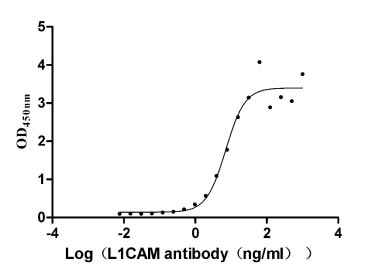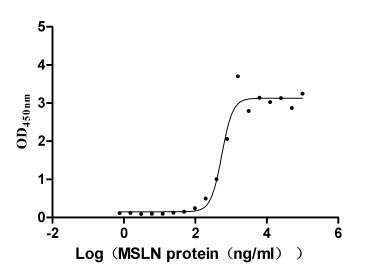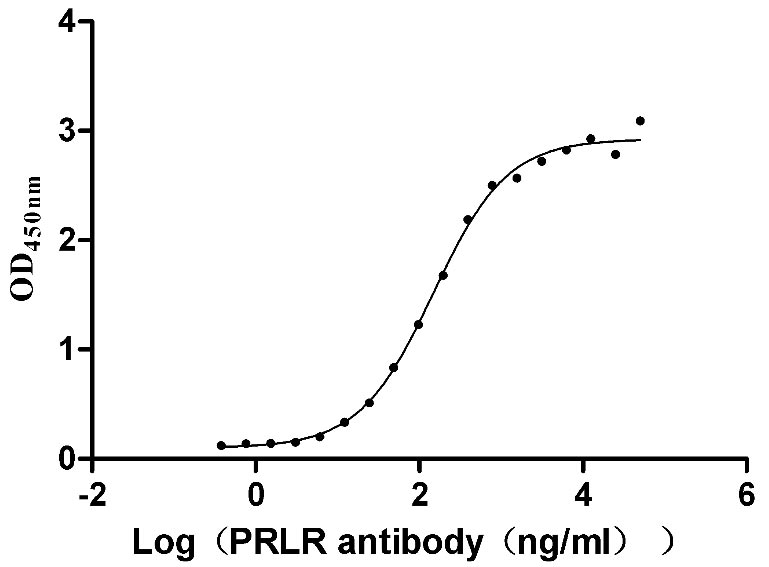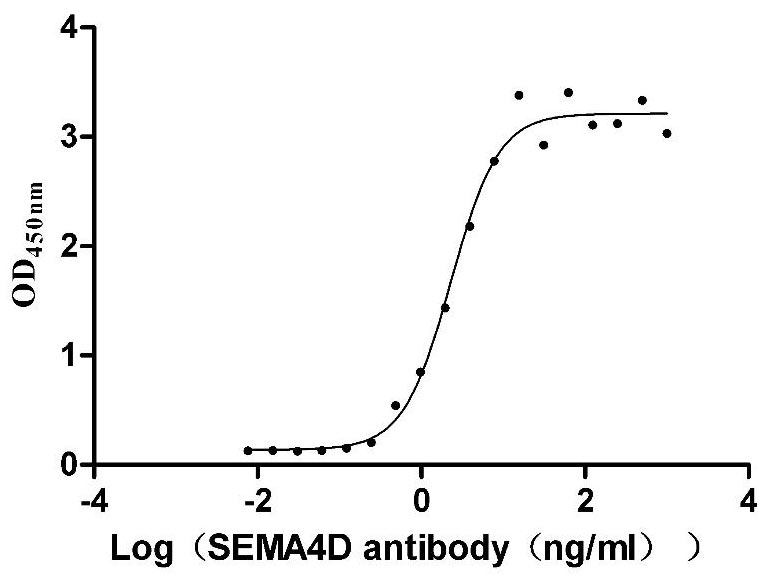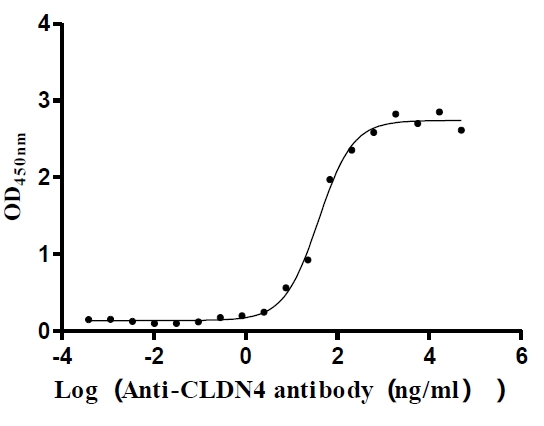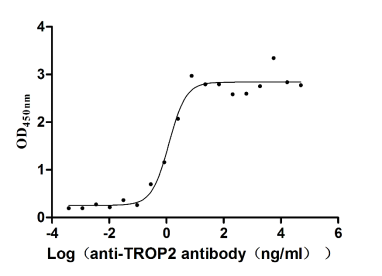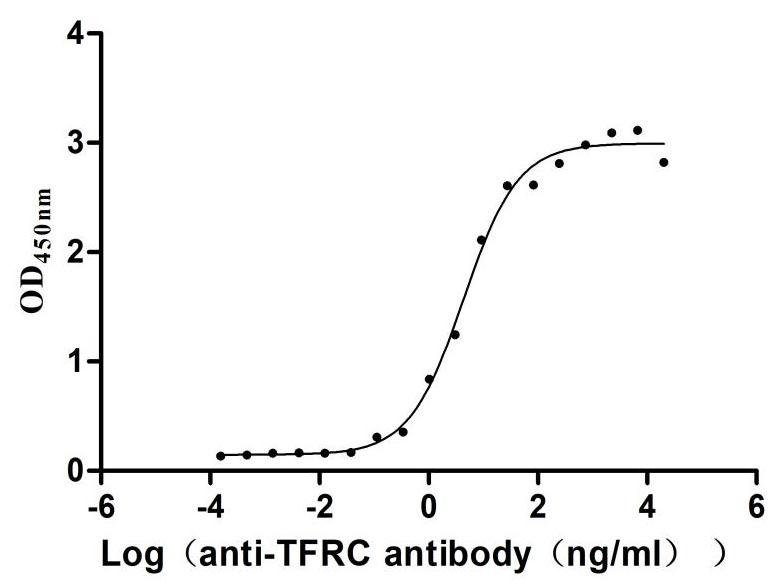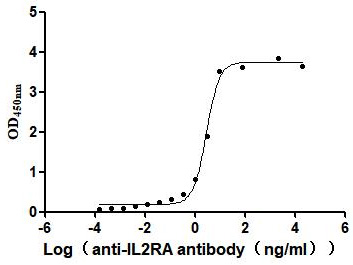Recombinant Human Steroidogenic acute regulatory protein, mitochondrial (STAR)
-
中文名称:人STAR重组蛋白
-
货号:CSB-YP022798HU
-
规格:
-
来源:Yeast
-
其他:
-
中文名称:人STAR重组蛋白
-
货号:CSB-EP022798HU
-
规格:
-
来源:E.coli
-
其他:
-
中文名称:人STAR重组蛋白
-
货号:CSB-EP022798HU-B
-
规格:
-
来源:E.coli
-
共轭:Avi-tag Biotinylated
E. coli biotin ligase (BirA) is highly specific in covalently attaching biotin to the 15 amino acid AviTag peptide. This recombinant protein was biotinylated in vivo by AviTag-BirA technology, which method is BriA catalyzes amide linkage between the biotin and the specific lysine of the AviTag.
-
其他:
-
中文名称:人STAR重组蛋白
-
货号:CSB-BP022798HU
-
规格:
-
来源:Baculovirus
-
其他:
-
中文名称:人STAR重组蛋白
-
货号:CSB-MP022798HU
-
规格:
-
来源:Mammalian cell
-
其他:
产品详情
-
纯度:>85% (SDS-PAGE)
-
基因名:
-
Uniprot No.:
-
别名:Cholesterol trafficker; Luteinizing hormone induced protein; mitochondrial; Mitochondrial steroid acute regulatory protein; StAR; StAR related lipid transfer (START) domain containing 1; STAR_HUMAN; StARD1; START domain containing 1; START domain containing protein 1; START domain-containing protein 1; Steroid acute regulatory protein; Steroidogenic acute regulator; Steroidogenic acute regulatory protein; Steroidogenic acute regulatory protein mitochondrial
-
种属:Homo sapiens (Human)
-
蛋白长度:Full Length of Mature Protein
-
表达区域:64-285
-
氨基酸序列EETLYSD QELAYLQQGE EAMQKALGIL SNQEGWKKES QQDNGDKVMS KVVPDVGKVF RLEVVVDQPM ERLYEELVER MEAMGEWNPN VKEIKVLQKI GKDTFITHEL AAEAAGNLVG PRDFVSVRCA KRRGSTCVLA GMATDFGNMP EQKGVIRAEH GPTCMVLHPL AGSPSKTKLT WLLSIDLKGW LPKSIINQVL SQTQVDFANH LRKRLESHPA SEARC
-
蛋白标签:Tag type will be determined during the manufacturing process.
The tag type will be determined during production process. If you have specified tag type, please tell us and we will develop the specified tag preferentially. -
产品提供形式:Lyophilized powder
Note: We will preferentially ship the format that we have in stock, however, if you have any special requirement for the format, please remark your requirement when placing the order, we will prepare according to your demand. -
复溶:We recommend that this vial be briefly centrifuged prior to opening to bring the contents to the bottom. Please reconstitute protein in deionized sterile water to a concentration of 0.1-1.0 mg/mL.We recommend to add 5-50% of glycerol (final concentration) and aliquot for long-term storage at -20℃/-80℃. Our default final concentration of glycerol is 50%. Customers could use it as reference.
-
储存条件:Store at -20°C/-80°C upon receipt, aliquoting is necessary for mutiple use. Avoid repeated freeze-thaw cycles.
-
保质期:The shelf life is related to many factors, storage state, buffer ingredients, storage temperature and the stability of the protein itself.
Generally, the shelf life of liquid form is 6 months at -20°C/-80°C. The shelf life of lyophilized form is 12 months at -20°C/-80°C. -
货期:Delivery time may differ from different purchasing way or location, please kindly consult your local distributors for specific delivery time.Note: All of our proteins are default shipped with normal blue ice packs, if you request to ship with dry ice, please communicate with us in advance and extra fees will be charged.
-
注意事项:Repeated freezing and thawing is not recommended. Store working aliquots at 4°C for up to one week.
-
Datasheet :Please contact us to get it.
相关产品
靶点详情
-
功能:Plays a key role in steroid hormone synthesis by enhancing the metabolism of cholesterol into pregnenolone. Mediates the transfer of cholesterol from the outer mitochondrial membrane to the inner mitochondrial membrane where it is cleaved to pregnenolone.
-
基因功能参考文献:
- The present study revealed that StAR overexpression can reduce hepatic lipid accumulation, regulate glucose metabolism and attenuate insulin resistance through a mechanism involving the activation of FXR. PMID: 28153708
- Reduced fractalkine levels were found in follicular fluid and granulosa cells, accompanied by decreased progesterone production and reduced steroidogenic acute regulatory protein (StAR) expression in the granulosa cells of patients with polycystic ovary syndrome. Administration of fractalkine reversed the inhibition of progesterone and StAR expression. PMID: 27386819
- Remarkably, in terms of fluorescence response, 20NP slightly outperforms commonly used 22NC and can thus be used for screening of various potential ligands by a competition mechanism in the future. PMID: 29408456
- solution structure of human steroidogenic acute regulatory protein STARD1 studied by small-angle X-ray scattering PMID: 28576490
- immunohistochemical staining for StAR is a reliable pathological approach for the diagnosis and classification of adrenocortical adenomas with cAMP/PKA signaling-activating mutations. PMID: 27606678
- Data suggest that expression of STAR (steroidogenic acute regulatory protein) and AKR1B10 (aldo-keto reductase family 1, member B10) is down-regulated in high-grade versus low-grade endometrial tumors; expression of AKR1B10 correlates with body mass index, with up-regulation of expression of AKR1B10 in obese patients with endometrial tumors. PMID: 28232277
- target of the microRNA let-7, which itself is regulated by the long noncoding RNA H19 PMID: 27813675
- Immunostaining of CLOCK and PER2 protein was detected in the granulosa cells of dominant antral follicles but was absent in the primordial, primary, or preantral follicles of human ovaries.Oscillating expression of the circadian gene PER2 can be induced by testosterone in human granulosa cells in vitro. Expression of STAR also displayed an oscillating pattern after testosterone stimulation PMID: 27614897
- Current level of understanding on tissue-specific and hormone-induced regulation of STAR expression and steroidogenesis, and insights into a number of cholesterol and/or steroid coupled physiological consequences.[review] PMID: 26271515
- activins A, B and AB down-regulate StAR expression and decrease progesterone production in human granulosa cells, likely via an ALK4-mediated SMAD2/SMAD4-dependent pathway. PMID: 26001835
- amino acid of mutant position of the novel p.E123K was highly conserved in ten different species and was predicted to have impacts on the structure and function of StAR protein by the PolyPhen-2 prediction software PMID: 26014698
- Mutagenesis confirmed that Arg(312) and Arg(313) are crucial for this mode of regulation, and novel interactions with the START domain PMID: 25002576
- StAR proteolysis is executed by at least 2 mitochondrial proteases, the matrix LON protease and the inner membrane complexes of the metalloproteases AFG3L2 and AFG3L2:SPG7/paraplegin. PMID: 24422629
- Hypoxia in pulmonary artery endothelial cells results in upregulation of STAR protein. PMID: 25001622
- BMP15 down-regulates StAR expression and decreases progesterone production in human granulosa cells, likely via ALK3-mediated SMAD1/5/8 signaling. PMID: 24140593
- The novel mutation p.Trp147Arg of the steroidogenic acute regulatory protein causes classic lipoid congenital adrenal hyperplasia with adrenal insufficiency and 46,XY disorder of sex development. PMID: 23920000
- Data suggest that mutation analysis of the STAR gene is essential for definitive diagnosis, genetic counseling, and prenatal diagnosis of Lipoid congenital adrenal hyperplasia (LCAH). PMID: 23748066
- Cholesterol-mediated conformational changes in StAR are essential for steroidogenesis. PMID: 24053410
- Expression of StAR and P45011beta (cytochrome P450 family 11 subfamily B polypeptide 1) is down-regulated in adrenocortical cells and neurons under oxidative stress by ALADIN (triple A syndrome protein, human) knockdown. PMID: 23825130
- deficiencies in the steroidogenic acute regulatory protein and the cholesterol side chain cleavage enzyme cause neonatal adrenal failure PMID: 23158025
- biochemical, genetic, and long-term clinical data in 5 Greek patients from 4 families with mutations in STAR gene (46, XX and 46, XY disorders of sex development): All patients presented in early infancy with adrenal insufficiency. [CASE STUDIES] PMID: 23211570
- Mutant FOXL2 in granulosa cell tumors is able to differentially regulate the expression of many genes, including two well known FOXL2 targets, StAR and CYP19A. PMID: 23029457
- Mutations in the CYP11A1 gene encoding cholesterol side-chain cleavage enzyme cause disordered pregnenolone synthesis, and STAR mutations do not necessarily results in typical congenital lipoid adrenal hyperplasia. PMID: 23330251
- The status of ARO and StAR contribute to estrogen synthesis in situ, especially for the regulation of elastic fiber formation, and to testosterone synthesis, which may be associated with hair growth, respectively. PMID: 22634420
- Allelic losses of the loci containing StAR have significant prognostic value for intermediate-risk prostate cancer. PMID: 22213075
- The STAR mutation spectrum has been investigated and a novel STAR mutation functionally analyzed in Korean patients with congenital lipoid adrenal hyperplasia; p.Q258X is the most common STAR mutation in Korea. PMID: 21846663
- analysis of angiotensin II-dependent transcriptional activation of human steroidogenic acute regulatory protein gene by a 25-kDa cAMP-responsive element modulator protein isoform and Yin Yang 1 PMID: 22253417
- report a novel transcriptional cooperation between GATA factors and cJUN on the mouse Star and human STAR promoters in MA-10 Leydig cells. This cooperation was observed with different GATA members, whereas only cJUN could cooperate with GATA factors PMID: 21350237
- StAR mutations located in the cholesterol binding pocket (V187M, R188C, R192C, G221D/S) seem to cause non-classic lipoid congenital adrenal hyperplasia PMID: 21647419
- a biological marker for Leydig cells and sex-cord stromal tumors PMID: 21217523
- The aim of this study was to investigate the effects of adiponectin on StAR protein expression, steroidogenic genes, and cortisol production and to dissect the signalling cascades involved in the activation of StAR expression. PMID: 21334384
- The role of protein tyrosine phosphatases in the regulation of steroid biosynthesis, relating them to steroidogenic acute regulatory protein, arachidonic acid metabolism and mitochondrial rearrangement, is described. PMID: 21145937
- The considerable extra energy expenditure that is required for synthesis of the long mRNA is used to provide a refined control of StAR expression. PMID: 21147196
- StAR, its expression pattern and the clinical consequences of the loss of its activity. PMID: 21164258
- GDF9 attenuates the suppressive effects of activin A on StAR expression and progesterone production by increasing the expression of inhibin B, which acts as an activin A competitor. PMID: 20660033
- novel SF-1 binding sites between 3,000 and 3,400 bp upstream of StAR PMID: 20601698
- study describes four patients with nonclassic or atypical congenital lipoid adrenal hyperplasia (lipoid CAH) identifes their StAR mutations and characterizes the activities of the mutants to explore genotype/phenotype correlations PMID: 20444910
- No associations between StAR SNPs and endometrial cancer risk were observed. PMID: 20199803
- Overexpression of StAR decreased number of apoptotic macrophages by decreasing expression of pro-apoptotic genes Caspase-3 & Bax mRNA, & through increasing expression of anti-apoptotic gene Bcl-2 mRNA levels in absence & presence of Ox-LDL. PMID: 19946756
- Increased steroidogenic acute regulatory protein expression is associated with endometriosis severity. PMID: 19930843
- FOXL2 is sumoylated by Ubc9, and this Ubc9-mediated sumoylation is essential to the transcriptional activity of FOXL2 on the StAR promoter. PMID: 19744555
- Leptin acts through the MAPK pathway to downregulate cAMP-induced StAR protein expression and progesterone production in immortalized human granulosa cells. PMID: 19849856
- No mutations in MC2R, MRAP or STAR were identified in any patient with Addison's disease PMID: 19903795
- StAR picks up cholesterol from a source in the outer mitochondrial membrane (OMM) and not from cytoplasmic cholesterol; StAR is stabilized at the OMM by cholesterol on its way to the mitochondrial matrix. PMID: 19899816
- StAR protein is an absolute requirement in the rate-limiting step in steroidogenesis, the transfer of cholesterol into the mitochondria [review] PMID: 12044915
- StAR can transfer cholesterol between synthetic membranes without other protein components found in mitochondria PMID: 12372832
- StAR requires structural alterations to allow cholesterol binding, most evidently by C-terminal alpha-helix above U-shaped beta-barrel. Unfolding of helix probable and leads to 2% subpopulation of partially unfolded StAR. PMID: 12530644
- modulation of DAX-1 and steroidogenic factor-1 intracellular levels in granulosa cells suggests that these transcription factors could be involved in mitogen-activated protein kinase suppression of steroidogenic acute regulatory protein expression PMID: 12727988
- Steroidogenic acute regulatory protein expression in the normal human brain and intracranial tumors. PMID: 12834921
- hCG-stimulated steroidogenic response in the mid- and late luteal phase is correlated with increased StAR mRNA and protein abundance PMID: 12843197
显示更多
收起更多
-
相关疾病:Adrenal hyperplasia 1 (AH1)
-
亚细胞定位:Mitochondrion.
-
组织特异性:Expressed in gonads, adrenal cortex and kidney.
-
数据库链接:
Most popular with customers
-
Recombinant Human Neural cell adhesion molecule L1 (L1CAM), partial (Active)
Express system: Mammalian cell
Species: Homo sapiens (Human)
-
Recombinant Human Mucin-16 (MUC16), partial (Active)
Express system: Mammalian cell
Species: Homo sapiens (Human)
-
Recombinant Human Prolactin receptor (PRLR), partial (Active)
Express system: Mammalian cell
Species: Homo sapiens (Human)
-
Recombinant Macaca mulatta Semaphorin-4D isoform 1 (SEMA4D), partial (Active)
Express system: Mammalian cell
Species: Macaca mulatta (Rhesus macaque)
-
Recombinant Human Claudin-4 (CLDN4)-VLPs (Active)
Express system: Mammalian cell
Species: Homo sapiens (Human)
-
Recombinant Human Tumor-associated calcium signal transducer 2 (TACSTD2), partial (Active)
Express system: Mammalian cell
Species: Homo sapiens (Human)
-
Recombinant Human Transferrin receptor protein 1 (TFRC), partial (Active)
Express system: Mammalian cell
Species: Homo sapiens (Human)
-
Recombinant Human Interleukin-2 receptor subunit alpha (IL2RA), partial (Active)
Express system: Mammalian cell
Species: Homo sapiens (Human)


